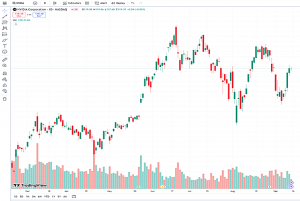
Insight by: Debbie Lin
If you’ve been following the stock market recently, NVIDIA has been front and center, influencing market confidence not just in AI but also in chip delivery. As the leading provider of GPUs essential for AI infrastructure, NVIDIA’s growth and success are directly tied to the AI boom. Investors have been pouring money into the stock, believing it to be the backbone of future AI advancements. But as the market grapples with questions about AI’s true capabilities, NVIDIA’s stock has been fluctuating, reflecting broader uncertainty about whether AI can truly live up to its enormous promise—or if this is another overhyped technology phase.
Life sciences are giving us a preview of what happens when AI doesn’t always hit the mark. Take Recursion, for example. The company uses machine learning and AI-driven platforms to discover drugs faster by analyzing vast amounts of biological data. It generated significant excitement, but reality set in after its recent Phase 2 results for a key drug candidate targeting symptomatic cerebral cavernous malformation,(CCM) were dis-appointing in terms of efficacy. The setback caused many to question whether AI alone can truly drive breakthrough discoveries in complex dis-eases, especially given the unpredictable nature of drug development.
But it’s not all doom and gloom. Big pharma is still betting on AI in a big way. Eli Lilly, for instance, is using OpenAI to help discover novel anti-infectives. Pfizer has also invested in AI, collaborating with AI startups like CytoReason to enhance its drug development pipeline. Roche is working with PathAI to improve diagnostics through machine learning, while Sanofi has teamed up with Insilico Medicine in a deal worth up to $1.2B dollars to explore AI-driven drug discovery. These partnerships show that, while there are some bumps along the road, major players in the pharmaceutical industry see AI as a critical tool for future innovation.

In the AI landscape, other players like Tempus AI are also facing the stock market rollercoaster. Tempus, an AI-driven company focused on precision medicine and data analytics, recently filed for an IPO, further fueling the excitement around AI in healthcare. However, like NVIDIA, Tempus has experienced stock fluctuations, with investors unsure whether the company’s AI-based approach will revolutionize the industry or merely lead to incremental improvements.
The big question now is whether the success of AI-based diagnostic and drug discovery companies is tied to big pharma. The short answer? Most likely, yes. AI startups often rely on access to vast datasets and regulatory expertise, both of which big pharma companies can provide. Moreover, big pharma has the resources to push AI-driven discoveries through costly clinical trials and regulatory hurdles. Given this, many of these AI startups could become prime partnership or acquisition targets for big pharma. Acquiring these AI companies could give big pharma a competitive advantage, turning these platforms into proprietary tools that differentiate them from their competitors. In my view, the jury is still out on whether a Big Pharma acquisition is the right acquirer or whether a large tools based diagnostics companies such as the ThermoFisher’s or Danahers of the world make more sense.
Whether the promise of AI will lead to major breakthroughs in drug discovery and development or just incremental insights is still to be proven. AI certainly has the potential to transform the life sciences, but it’s early days, and some of the excitement may be premature. The real question is whether AI can consistently deliver results that go beyond what traditional methods have achieved, or if it will merely speed up existing processes without unlocking fundamentally new insights.
So, is NVIDIA’s stock whipsawing due to AI uncertainty? Yes, but that doesn’t mean AI won’t succeed. Like anything revolutionary, it will take time, trial, and error. The AI hype train might slow down at times, but it’s not derailing anytime soon—especially with major industries like life sciences still placing big bets. Big pharma’s involvement will likely define which of these AI companies rise to the top or become the next generation of industry-defining tools.




